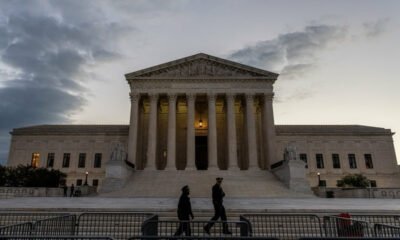2020 election
Appeals Court Judge Linked to 2020 ‘Alternate’ Electors Case Contributes to AG Mayes Campaign

By Staff Reporter |
In a notable development regarding the “alternate electors” case, it has come to light that Judge Andrew Jacobs of the Arizona Court of Appeals contributed to Attorney General Kris Mayes’ campaign. This donation occurred during her pursuit of allegations against the 2020 electors supporting former President Donald Trump.
Wednesday marked a pivotal moment in the legal proceedings, with oral arguments presented in the appeals court shortly after Mayes urged the court to overturn a prior ruling by a lower court. Jacobs, who was appointed by Governor Katie Hobbs in February 2023, donated $500 to Mayes’ campaign. His contribution followed her public commitment to investigate the alternate electors.
Mayes asserted her intention to prioritize this investigation if elected. “I would have immediately investigated the alternate electors as Attorney General,” she stated, emphasizing the need for accountability and integrity in the electoral process.
A further examination of Jacobs’ involvement reveals that he made a second donation just after a report highlighted the stark contrasts between Mayes and her opponent Abe Hamadeh, now a congressman.
During the emergency hearing, observers described Jacobs’ demeanor as “hostile” toward the electors. Despite the potential conflict of interest raised during the oral arguments, Jacobs voted on a significant issue: whether to grant a stay in the case.
Previously, Maricopa County Judge Sam Myers ruled that the 16 2020 electors presented enough evidence suggesting that Mayes’ prosecution could be dismissed under Arizona’s Anti-SLAPP law. This law is designed to prevent lawsuits aimed at silencing political speech.
Judge Myers indicated that the electors’ actions might fall under protected speech rights, citing Mayes’ own statements as potentially politically motivated. In response, Mayes contested this interpretation, asserting that filing forged elector slates does not qualify as lawful speech.
To challenge Myers’ ruling, Mayes needed to demonstrate her lack of retaliatory intent in her ongoing prosecution of the 2020 electors. The decision regarding her motion remains pending.
Last week, Judge Myers dismissed claims made by the defendants aiming to halt Mayes’ case, which argued that she lacked the authority to prosecute and failed to identify any crimes. Additionally, the case has faced procedural complications, including the recusal of the first judge, Bruce Cohen, after the emergence of emails suggesting bias toward then-presidential candidate Kamala Harris.
The case includes prominent figures such as former AZGOP Chair Dr. Kelli Ward, former Arizona State Senator Anthony Kern, and several others connected to the Trump campaign. The complexities of this legal battle serve as a critical focal point in Arizona’s ongoing discussions about electoral integrity and political accountability.


















